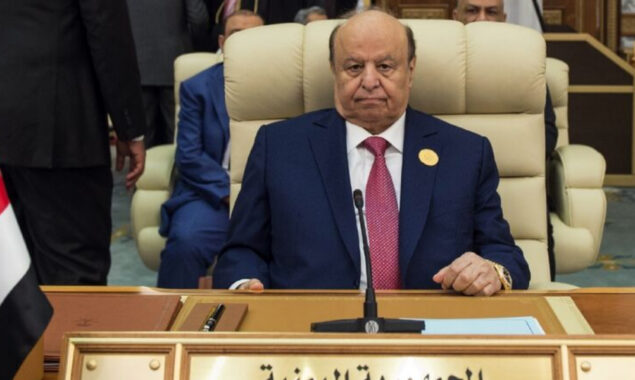Iran’s Quds Force to remain on the US terrorist list
The top US general has stated that he does not favour the...

Many Yemenis are not saddened by the end of President Abd-Rabbu Mansour Hadi’s term in office.
That says a lot about the president of a guy seen as a “accidental” leader who has been unable to properly lead government troops during the country’s almost eight-year civil war.
When Ali Abdullah Saleh, the country’s 33-year leader, was driven out in 2012 following a year of Arab Spring protests, Hadi, Saleh’s former vice president, was parachuted into the presidency.
He was meant to be in charge for two years and act as a bridge to complete, inclusive democracy in Yemen.
Hadi, on the other hand, turned a blind eye to the developing power of the Iran-backed Houthi rebels in the north, who finally overtook Sanaa in 2014 and forced Hadi to flee in 2015.
Hadi was unable to meet the demands of being a wartime commander.
He seemed servile to Saudi Arabia, which was now battling the Houthis on his behalf, while stuck in Riyadh.
Yemenis have had a president who has spoken to his people on television only a few times in recent years. Salaries went underpaid while the battle raged, and a humanitarian calamity ensued.
So, despite his exile and unpopularity, what maintained Hadi as president for so long?
Hadi’s “legitimacy” as the internationally recognised president, as well as a lack of an option that might be supported by the fractured anti-Houthi alliance.
However, it appears that the Saudis have had enough and have decided that the best approach is to bring together leaders from various anti-Houthi factions into a single presidential council in the hopes of keeping everyone pleased.
Observers should not expect the eight-member group, which was unveiled on Thursday, to remain unified.
Aidarous al-Zubaydi, for example, believes in the secession of southern Yemen from the state and declares himself the president of the region.
The presidential council’s various interests are certain to collide. The question is whether they can stay on topic and put their differences aside for the time being.
The retirement of Vice President Ali Muhsin, a senior military figure who has been influential and contentious for more than 40 years, would be welcomed by many, including Yemeni forces sponsored by the United Arab Emirates.
Muhsin has long been affiliated with Islah, Yemen’s Muslim Brotherhood-influenced party, which Zubaydi’s Southern Transitional Council and other UAE-backed factions vehemently reject.
Islah, on the other hand, will be comforted by the presence of Sultan al-Aradah, the popular governor of Marib who is close to him, and the president of the council, Rashad al-Alimi, who has strong links with the party leadership, on the presidential council.
Saudi Arabia and the United Arab Emirates have rushed to express their support for the presidential council, pledging $3 billion to help the Yemeni economy.
The Saudi-led coalition’s unwillingness to provide much in the way of economic help and weaponry to the Yemeni government, which it was ostensibly fighting for, revealed the coalition’s displeasure with Hadi and others surrounding him during the last few years.
It was a major driver of the Houthis’ military expansion at the time.
Is this a government with which Saudi Arabia and the UAE can now work? Will they now increase their support if that’s the case? What does it imply for Yemeni sovereignty when neighbouring nations have such a tight grip on the country’s government and identity?
Of course, the elephant (not) in the room is the Houthis, who declined to attend the Riyadh negotiations that preceded the presidential council’s pronouncement.
The presidential council was instantly criticised by Houthi leaders, who described it as being imposed by outsiders and not representative of Yemen. The organisation also claims that this further weakens the legitimacy of the Yemeni government.
In actuality, the Saudis and the Houthis have been in talks for some months. This month, a two-month truce went into force, indicating that there is a drive for de-escalation, at least temporarily.
This was bolstered when Yemen’s Saudi-backed Prime Minister Maeen Abdel Malik announced following the establishment of the presidential council that the military option had “failed.”
That recognition indicates that the Saudi-led coalition’s and Yemeni government’s official narratives are that political discussions are the only way to end the conflict, and that the presidential council’s job is to facilitate them.
The question today is whether Yemen’s elites are ready to offer the Houthis a seat at the table, and if the Houthis can be trusted to share power in the first place.
If those discussions fail again, the change of this political presidential council into a war council – as well as the continuance of this catastrophic battle – might happen swiftly.
Catch all the International News, Breaking News Event and Latest News Updates on The BOL News
Download The BOL News App to get the Daily News Update & Follow us on Google News.